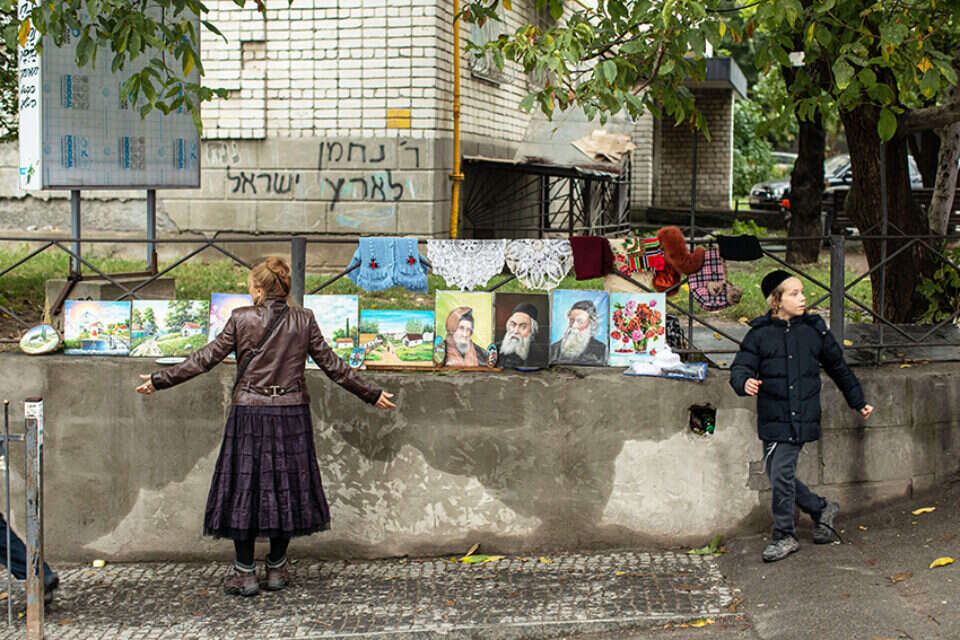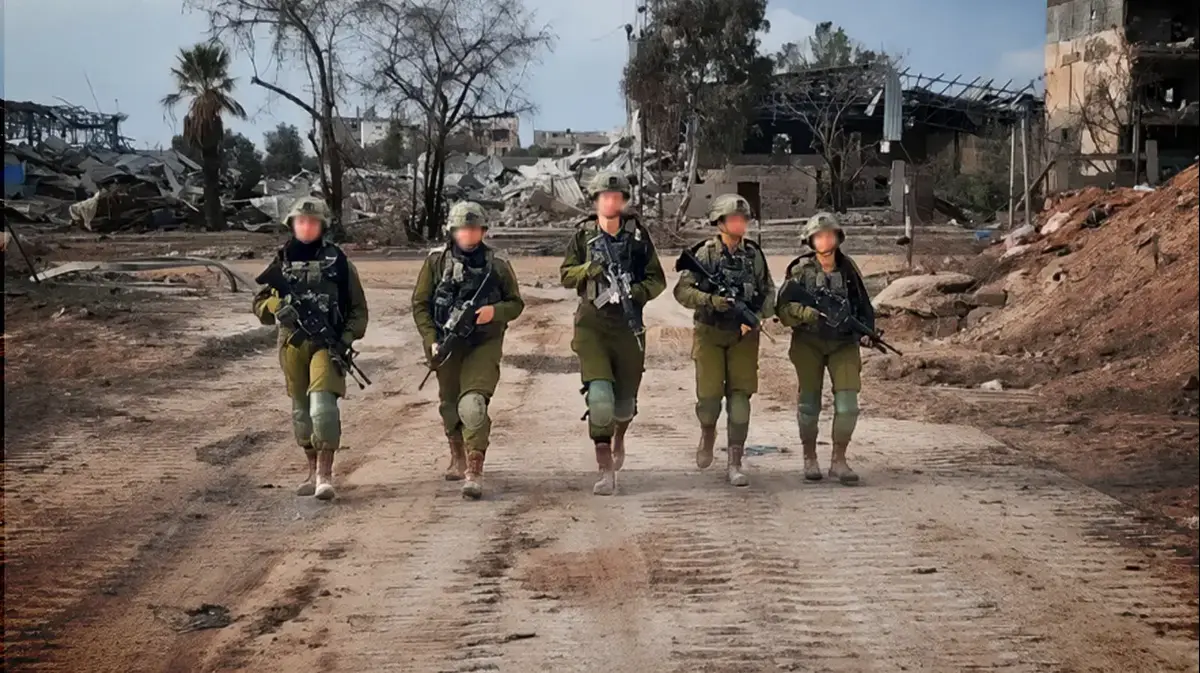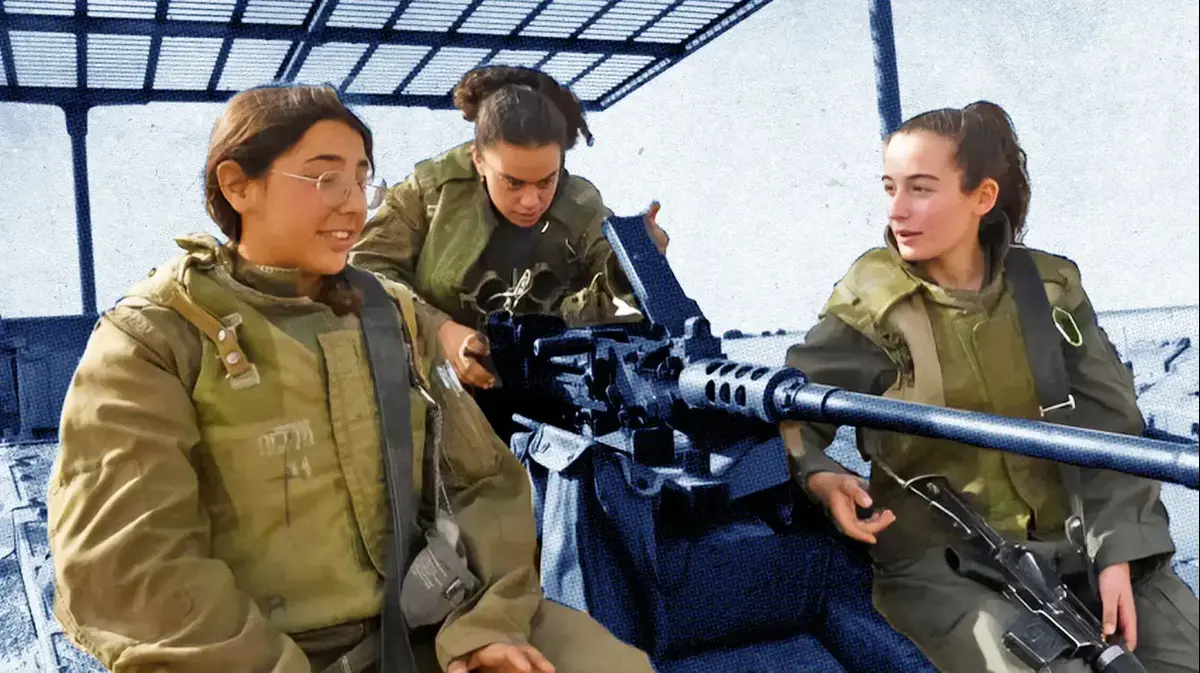"Welcome to the palace, you have come to the right place," Adel Levy greets us at the side entrance to the women's aid in Zion, the grave plot, of Rabbi Nachman of Breslav.
Adele is one of the most senior daughters of the king in the female realm in Oman.
For 22 years, she has been visiting the place - the kibbutz, in Hasidic parlance - five times a year.
Among other things, she makes it a point to show up on Rosh Hashanah as well, the time apparently designated officially for men.
The war now raging in Ukraine did not stop her, and six weeks ago she set out on the long road, from Ma'ale Adumim to distant Le'Uman.
"The tzaddik invited me here, just like he invited you too," she clarifies, "you didn't come alone. You came because the tzaddik loves you."
Complex to feel love rising from bones that were covered in dirt almost 212 years ago, but if love is distributed here for free, who am I to object.
"I'm here instead of my husband," explains Adele, mother of six and grandmother of six, what she does in Uman during the Tishrei holidays.
"The Breslav women have gained courage. They make it clear to the husband that there is no chance he will fly without them", photo: Avishag Shaar-Yashov
"My husband can't come because of business, so I come for him, to pray for my children and the people of Israel. The war doesn't scare me. The truth is that I was more afraid not to come than to come. And here, really, everything is as usual. It's true that there are alarms from time to time, but it's not serious".
Adel introduced the Torah of Rabbi Nachman into her home, after she arrived in her youth by accident ("with torn jeans and hair dyed blonde") to Oman.
When she returned to Israel, she began the process of repentance.
Some of her children were influenced by her, and others continue to lead a secular lifestyle.
"My husband is not really a Chassid either, but he believes in the righteous."
Is the belief in the tzaddik or in God?
"In the righteous and in the name. Wait, did you say general correction? Did you give charity? Did you say confession?"
The last questions will be asked again and again, by almost every woman we meet during the day, inside or outside the Zion.
In return, we will be asked what they think about the pashkovils plastered on the streets of Bnei Brak, Ukraine: "A call of warning and a special request for the preservation of the sanctity of the kibbutz", the words scream in black and white against the family mix of the visitors to Uman, which creates a mix between women and men.
"Therefore, we must hurry and do as much as we can to send the members of the household back to their homes as soon as possible. And those whose members of the household are unable to return to their homes, are strictly forbidden to leave the house on all these days. You will not even go to the Holy Zion at all... We are sure that the righteous women who will preserve the sanctity of the kibbutz and the sanctity of the camp and they hasten to leave the city, they will surely receive a great reward from heaven..."
Adele is not moved by the voices trying to try from the city.
She walks freely around Oman during the days of Elul, and she has no intention of going into quarantine on Rosh Hashanah either.
"I go out to pray in the grass behind the Zion, there is great sunshine there."
Why in the grass?
Because the women of the palace are removed every year from the women's aid, which is nationalized for the benefit of the male majority that fills the streets of the city.
"We need to open a large place for women, so that they can pray in it on Rosh Hashanah," states Adel.
At first she is willing to take a picture without hesitation, but then her secular daughter asks her not to take a picture, and she respects her request.
The sanctity of the kibbutz
The sisters Shiral (23) and Yael (21) Bacher, who pass us up the stairs in the wacha shoka, are not moved by the ads that decorate the fences and the walls, nor is the wording particularly offensive: "Don't be a Shlaimselnik!!! The sanctity of the kibbutz depends on you! By the order of the rabbis of Israel : Don't buy products sold by women!!"
"It's just," says Shiral, a student who is connected to Rabbi Nachman's Torah, "it's signs of Berland Hasidim. No one pays attention to them. We came to strengthen a little in Elul, but we'll return home before Rosh Hashanah."
"Our rabbi said that there is no impurity in his area."
The sisters by the local river,
Why?
"Because Rosh Hashanah is for boys. It is less appropriate for unmarried girls to be here. Especially on Rosh Hashanah there are many more men than women in Uman, so it makes sense to me that women's help is closed."
"On the weekends there were 1,000 women here, yet they closed the women's aid," comments Yael.
"What will the women who stay here do in this rainy weather? How will they pray outside?"
Drips of rain trickle down from time to time, and the Bacher sisters wear a scarf on their heads.
The poor market stalls are covered with plastic strips because of the rain.
Among the local bastas, operated by the Ukrainian residents, there are also Hasidic men and women.
Some Hasidic approach to purchase products at a stand where the sellers are local women.
The ads seeking to avoid this seem to be dead letters on the wall.
One Hasidic in full Taliban garb, which includes a foil for the face, kneels in front of a bucket of tomatoes and examines the goods.
Avishag the photographer documents her attention-grabbing figure.
I approach to ask the woman in the sea of fabrics if she would like to be interviewed, and she politely declines.
"Men's Scratch"
The one who is happily interviewed is Racheli Yeshua, 45 years old, a convert, mother of seven, who walks with her family among the kosher shops in Pushkina Square.
"She came to write," she grins at me to herself.
"Our rabbi brought you. He has all kinds of rounds to bring people here. Did you say the general correction?"
Lauman arrived with her husband Roy and the children from their home in Bar Yohai, near Miron, about three weeks before Rosh Hashanah.
Their simple clothing, some would say poor, raises the question of how they managed to finance a trip that requires financial means for nine people.
"It is indeed very expensive. We organize about it. We open savings plans, bring here and there, some grandmothers, and come to our house.
"We haven't been in the last two years because of the corona virus, but apart from that, I've been coming to Uman for Rosh Hashanah for 21 years. A company managed to arrange one-way tickets for us relatively cheaply. We were so excited, so we immediately jumped on it. Now we're working on return tickets, so that on Yom Kippur we can already do at home."
What do you think about the pashquevilles who demand the women not to go out on the street?
"I think it's madness for people who try to run the world, without realizing that there is a name that runs the world. I'm very at peace with being here. I don't feel any need to hide. Of course I won't stand out on purpose and go in their face, but I live my life I don't come to annoy and fight anyone, but I'm really not one of those people who won't leave the house for a week. On the holiday itself, I go up to the Zion area, to the grass, which in the last ten years has really become a help for women.
"There are women who are like the husband's bodyguard", photo: Avishag Shaar-Yashov
It should be understood that some extremists are responsible for Pashkovil.
Most people are happy and wish us a happy new year.
Until 20 years ago, the whole story of Oman on Rosh Hashanah was very, very ultra-Orthodox.
Over the years it has opened up.
The nature of the population has changed.
I feel that they are trying to hold on to something that belongs to the past.
"By the way, there is no hint in our rabbi's words, and no one I have found in his writings, that he intended for women not to come here on Rosh Hashanah. He always said: I want you to make your wives Chassidim. I really see this as some sort of authoritarianism, which is not It's really based on something. I know for sure that in the past, when it was forbidden to enter here under the Soviet Union, Chassidim would sneak in here together with their wives."
How many women come to Uman on Rosh Hashanah?
"Until Corona, it was something like 500 women. By the way, the wives of the rabbis of Breslav also come here, while their husbands take out all these pashkevils, and some even leave the house."
"Their wives are here because they need someone to cook," joins the conversation, Roy, her husband.
"But your wife Racheli didn't come here to cook, she came for spirituality," I scold him.
"Obviously", he laughs, "I cook".
Racheli: "It infuriates me that the women's aid is closed, but I don't have the strength to rebel, you understand. I'm not there, I'm not in the place of fights."
Roy: "I don't see how it is possible to find a solution where the women can pass through a street that is crowded entirely with men."
Racheli: "It's not complicated, especially this year when there are fewer people. They got stuck in the past. I feel from the bottom of my heart that this is an invitation from the righteous, that this is what belongs to my soul. In my story, this is a side that is very clear to me, and that's why I don't come to fight with them and shout: Open the score."
Is anyone shouting?
"Sure. There are women who shout. There is everything here. This year, the Zion is closed on Wednesday at six o'clock, four days before Rosh Hashanah. At the closing, everyone reacts to it from their places. I happened to see fierce fights there and shouts: 'You won't take me out, you will Get me out. You are chauvinists.'
There are interesting women here.
You see that our Lord attracts souls of all kinds.
This is such a sample of all the people of Israel, especially women.
You see such and such ultra-Orthodox women, and those who have teshuvah, and girls who came from nature parties and turned into an artist.
You just see everything here.
This is amazing.
There is something in your heart that draws you to our Lord and there is no exact explanation for it."
The entrance to the women's aid complex, photo: Avishag Shaar-Yishov
Are you in favor of single girls also coming to Uman on Rosh Hashanah?
"Sure. It's a scratch on the head of the extremist men that someone is coming for them. They're coming for our Rabbi. Of course single women too, everyone should come. And by the way, now that the situation is sensitive with the war, what do you see here the most? Mothers and children. Women who are not afraid, women Heroines, women who stood up in such a situation against the whole world and brought their family here."
Did you hesitate to come this year during the war?
"Of course there was hesitation. We checked among ourselves if we felt fear. You know, we have no interest in endangering our children, we are not crazy. There must have been hesitation. My husband was here for weeks, and then he realized that the war is not in the area."
The Yeshua family is only willing to be photographed from the back.
"Let them not see the teeth," Roi laughs about the teeth of the family members, who obviously won't be harmed by medical treatment.
"Happy New Year", they wish warmly and continue on their way.
"Our Lord is salvation"
From the street we climb up to one of the buildings towering over the Zion, to photograph the complex from a bird's eye view.
D., in her 50s, opens the door for us and allows us to photograph the landscape, but not herself.
Her face lights up and she speaks calmly, but while talking continues to toil in the kitchen.
"I came to Uman a few weeks ago, because I entertain a lot of people and I have to cook."
Hospitality for women?
"No, I only do it for men. I come here with my husband and children and we host about 50 guys for seven meals, on Shabbat and on the holiday. On the holiday itself I don't leave the house. This is very important. Some go out into the street, which really doesn't belong. There are too many Men are out in droves."
What does your new year look like?
"Me? I don't have time at all on Rosh Hashanah. I cook, serve, take down. My Rosh Hashanah is in the kitchen."
And are you okay with that?
"I'm fine with it. Serving our Rabbi is something special, it's a privilege. It's amazing to be here on Rosh Hashanah."
Can you feel the transcendence while doing it?
"Very very. Even if I don't particularly stop to listen to the shofar, up here you can hear all the prayers and the blasts best. If with God's help I have a helper, maybe I can pray more."
Who helps you finance the hospitality?
"No one. Only God and our Lord.
In Israel we had a small apartment, we sold it and bought two apartments here, because here it is much cheaper than in Israel.
The apartments are waiting for us all year round.
We bought it for Rosh Hashanah for our son, and I come here with my husband in the middle of the year as well."
It seems that you are rebuilding the exile here. Isn't the redemption supposed to be in the Land of Israel?
"Our Rabb is redemption. Unfortunately, redemption still has to be in exile, that's the situation. Don't you feel that the Land of Israel is in spiritual exile? There is a lot of gratuitous hatred in Israel and no peace. We personally have suffered hatred in Israel. Our main activity in Israel is in operating educational institutions, but there is Something about the artist, in the presence of the tzaddik, which makes people love Israel, there is a lot of help and warmth here. Our rabbi said: The love that will be between my people - the world will marvel at it. Whoever has a relationship with a tzaddik becomes a new person. Instead of being petty and hating and fighting and competing and jealous, he We become a Jew with the love of Israel. This is something else. Without the tzaddik there is no such thing. There are many tzaddiks in Israel and in the world, but our rabbi is the tzaddik who is no different from the Messiah."
Women earn twice the average salary in Ukraine.
Wicca the local cleaner,
The queen in yellow
Like D., another 1,000 Hasidic families from the US and Israel purchased apartments in Uman, Chaim Hazin tells us. Hazin is a businessman, owner of the hotels "Baboushka" and "Heart of the World", a father of seven, a resident of Uman for a decade and who has earned the nickname "The Sheriff of an artisan." We sit down to talk with him over cheesecake in a hotel shelter in Bushka, whose windows are covered with sandbags. "During the war, I bought an entire building for one million shekels, instead of one million eight hundred," he says. "It's a project called 'Yishuv Ha'ad' of 54 apartments, the skeleton already built.
I sold 14 apartments in the last two weeks.
Apartment prices range from $30,000 for a student apartment to $300,000 for the luxury apartments." Hazin says that the permanent Oman community numbers about 100 families, 60 of whom fled to Israel when the war broke out, "and now they are starting to return.
We left Ukraine on the second day of the war, and I returned when the winds calmed down a bit, even before the family.
Currently there are 3 in the city,
This year the thousands of followers will not be able to reach Uman on direct flights to Ukraine because the Russians bombed the country's airports.
Everyone who arrives does so by flying to one of the neighboring countries, and from there crosses the border, despite the severe travel warning issued by the Ministry of Foreign Affairs in Jerusalem.
Why is Zion closed to women on Hanukkah, Shabbat and Rosh Hashanah?
"There is a tradition among the elders of Breslav that the Zion on these days is for men only. The women's time is Tu Bab, and then they almost close the Zion for the men.
Singers, rabbis come here, there is a competition between them all.
About 4,000 women come on Tu Bab, but in the end there are about 500 women here on Rosh Hashanah itself. You see them peeping out the windows. They pray in women's apartments, on the high floors of the buildings above the Zion. A wealthy Hasidic from America told me that his wife told him 'I'm not letting you go to Ukraine without me. If you want to go to Uman, I'm your bodyguard.' Some women are like bodyguards."
Simcha Jan actually has her own bodyguards, her brothers who help her run the world.
If the women up to this point could be roughly categorized as daughters of a king or as servants in the holy of holies of the kitchen, Simcha, the rabbi's daughter, holds both.
Only 20 years old with the mannerisms of a queen, a modern block, a bright yellow shirt, sneakers, a fluttering skirt and big earrings.
Unlike others, she responds to the camera without hesitation.
She also introduces herself by her maiden name, Jan, and not by her new husband's name, Magen, apparently a feminist act.
Her confident speech and the way in which she manages the store she owns with a high hand but with ease, do not really fit with the content of her words.
"I've been in Uman since I was 12 years old. When I was still studying in Israel I traveled and came back all the time, and for the last four years I've actually lived here, except for six months of the Corona virus," she says after we finally managed to settle into the hectic pace of her day.
"I manage my father's store, and also the meat factory. It is a store of kosher meat and kosher products that people need. My father is Rabbi Yaakov Jan, the chief rabbi of Oman. You can say that I, the middle daughter among seven brothers, Yad our days".
20 years old with the mannerisms of a queen.
Simcha Jan,
Simcha got married in Israel two weeks before the outbreak of the war in Ukraine, and her father managed to get to the wedding on the last plane out of Kiev.
The father, by the way, was involved in underage marriages in Uman.
"Because of the war, we stayed in Israel for a while, but after a while I started making trips here every two weeks. How can I explain to you - even when I had nowhere to bring products, because everything was closed, I made sure the store was open. Not for profit, but for serving people, so that Kosher food for those who stay here. Now we have filled the store for Rosh Hashanah. It is also very difficult. Many food warehouses were bombed. Three agents with whom I worked closely were killed on the war front," she sighs sadly.
"And I intend to stay here on Rosh Hashanah as well because I am hosting hospitality for 700 people. I am not advocating that women be here on Rosh Hashanah, unless they live here or have something to do here. To come especially? I don't think it is appropriate. My Rosh Hashanah is spent cooking, without a single hour of sleep. My brothers make sure I blow a shofar. I don't go near Zion because it's going through men, it doesn't suit me. I really like the atmosphere at Bauman's holiday. It's impossible to explain in words. Whoever was here once , can't help but be here again every year. I have friends who are not ready to give up. They lived here as teenagers, got married and live in Israel, but they always come to celebrate Rosh Hashanah with their parents. But girls my age who don't have family here, just come here? The evil spirit for the boys who come here alone."
Isn't the bad habit the men's problem?
"You are 100 percent right. But Rosh Hashanah is not for women, and anyway the grade is closed to women. I think that women, certainly young girls, should not be here."
Proper behavior precedes the Torah?
He who still cares for the evil creation of men is a mercy.
We find him sprawled on one of the beds in a room in a building near Zion that is undergoing renovations, taking a nap.
He does not sleep at night, in a race against time as the renovation manager of the building that is buzzing like a beehive.
The laborers are Ukrainian laborers, and alongside them are also plastering older Ukrainian women.
"I deliberately take older women as roommates, so as not to fail the boys," explains Rahamim, 37, father of eight.
"Vika, we need to arrange the rooms 5-1", he explains in Russian, smiling at Vika.
"We love working here," says Vika between the mop and the bucket.
"I get a lot of money, 50 hryvnias per hour" (an amount that is at least twice as high as the average salary in Ukraine).
"The maids asked to work overtime even in the construction itself, so I let them plaster," Rahamim explains.
"By the way, today Oman is not what it used to be. Prostitution and drugs are very much on the fringes. People make such a tremendous effort to come here during a war to get clean. Those who are looking for nonsense - today find it easily in Israel."
Are you staying here on New Year's Eve?
"No, I just want to fly home from here. On Rosh Hashanah I'm at home in Israel. My friends must not know that I'm not staying here on Rosh Hashanah, they'll kill me. My wife threw me here, to end all the pressures and return calmly to the holiday. Today we see many more women who come Lauman for Rosh Hashanah. The Breslav women gained courage. They make it clear to the husband that there is no chance he will fly without them. If the war calms down next year, I will come with my wife and children to Lauman for Rosh Hashanah."
It's dinner time outside, and the devotees - mostly young men, but also women and children - flock to the hospitality of Peretz Krahan, the director of the GAM, where they hand out a hot meal to the girls with care. Some take the bags to their rooms, others eat them standing on the street." Today we distributed 1,000 cooked and healthy meals at a cost of $4,000.
We cooked 60 kg of rice, chicken, a healthy soup. The truth is that we are collapsing because of the load," describes Peretz, a resident of Oman for a decade.
He is among the pots, as is his wife who is preparing to host the married children who come to Uman from Israel on Rosh Hashanah.
"This week I saw that my wife was already collapsing from all the preparations for the holiday, so I made her a surprise and took her for a night's vacation in Kiev, to ventilate her a little."
Talia, a smiling 15-year-old girl, and her younger sister usually hang out on the edge of the river, a surprising green on the edge of urban density.
"Since I was born, I've been here every Rosh Hashanah. We come together as a family from the beginning of the month of Av until after the holidays. Since my mother came here 20 years ago, she couldn't stop coming, and since then all the children come with her. We are nine children, I'm the sixth. I live in Hebron and study in Beitar Illit, in a school that doesn't care that I don't settle in," she laughs.
The sisters usually dip their clothes in the picturesque river before the beginning of Shabbat and the holiday, even in the autumn weather.
In front of us on the far bank of the river stands a large statue of Jesus (around which every year there are riots between the followers and locals), and for a moment it seems that the two innocent girls are praying to him.
In the end, Ukraine is a land of Gentiles - the Holy One is in the Land of Israel, isn't it? After all, Rabbi Nachman himself made an effort to reach Eretz Yisrael.
"Our Rabbi said that there is no impurity in his area. He said that no one should be absent on Rosh Hashanah, and whoever comes - he will purify him, and no matter what he has done during the year, even the most serious offenses," Talia describes in simple words ideas that seem to have been borrowed from church rituals.
Talia says that the members of her family pray on the holiday itself on the grass behind the Zion.
They get up as early as 5 in the morning and walk around the city, but "make sure to go out modestly. We have no interest in missing men."
Has anyone ever told you anything?
"No, no one warns us."
We actually do.
When we arrived, Avishag and myself, in front of the main entrance to Zion, the local guard demanded that we stay away from the entrance intended for men.
A bearded Hasidic for the white man of the city who will stop making men go astray.
We walked away wondering how modesty came to predict everything, while whitewashing was relegated to a corner.
The long day in the feminine realm of Oman, where love is distributed for free, brought the insult into proportion, brought us together with a more complex picture, from which we tried to raise sparks of logic amidst the madness.
were we wrong
We will fix it!
If you found an error in the article, we would appreciate it if you shared it with us















